
If you need proof that the current Emmy voting system is broken, you need to look no further than the Supporting Actress in a Limited or Anthology Series race. Despite having seven available slots, only two shows appear in the lineup. Unsurprisingly, they are The White Lotus and Dopesick, two of the year's biggest frontrunners. Allowing voters to check an unlimited number of names on their ballots means that the most popular and acclaimed programs will dominate, no matter the specifics of the category. Unfortunately, this takes away slots to honor MVP achievements in less buzzy shows.
For predicting purposes, it also muddies the waters...
It's tough to understand if the TV Academy feels passionate about these specific performances or if it's just in love with the show they're in. If anything, the current system only serves to spotlight those few artists who were snubbed despite their show's success. Rosario Dawson is the only eligible Dopesick actress left out of the ballot, while Brittany O'Grady is the sole member of The White Lotus female cast without a nomination. Why exactly were they left out? That will have to remain an irritating mystery while one ponders the merits of the seven nominees…
Outstanding Supporting Actress In A Limited Or Anthology Series Or Movie
Nominees:
- Connie Britton in The White Lotus, Episode: "The Lotus Eaters" (S01E05)
- Jennifer Coolidge in The White Lotus, Episode: "Mysterious Monkeys" (S01E03)
- Alexandra Daddario in The White Lotus, Episode: "Departures" (S01E06)
- Kaitlyn Dever in Dopesick, Episode: "The Whistleblower" (S01E05)
- Natasha Rothwell in The White Lotus, Episode: "Departures" (S01E06)
- Sydney Sweeney in The White Lotus, Episode: "Mysterious Monkeys" (S01E03)
- Mare Winningham in Dopesick, Episode: "Black Box Warning" (S01E07)
Analysis: For the last few years, actors in the Limited Series supporting races have been submitting episodes like their fellow nominees in the Comedy and Drama categories. Considering other changes made in the same period, it's unclear if this factors into the final vote or is a mere formality. Episode submissions don't seem to matter much anymore -- not in the acting categories, at least. Long gone are the days of special committees that had to watch every submission before committing to their choice. Still, since the performers have selected a particular chapter of their series for consideration, let's consider them.
Jennifer Coolidge and Sydney Sweeney submitted The White Lotus' third episode, a showcase hour for the older actress who feels like the favorite to win. "Mysterious Monkeys" finds Coolidge's Tanya booking a boat to spread her mother's ashes in the ocean. Unfortunately, in this panic attack of a show, that mission results in a total meltdown for the grieving woman. Aided, in no small part, by her constant drinking, Tanya is a mess, falling deep into insecurities, fears of becoming the mother she both loved and hated, alcoholism, and nymphomania. That being said, what most impresses in Coolidge's portrayal is her ability to draw humor out of despair. She breaks your heart and makes you giggle at the same time.
Though Tanya is a dramatic breakthrough for the comedic actress, she still makes her funny, connecting the varying tonalities of Mike White's script with apparent effortlessness. A show of vulnerability can quickly reveal the commanding entitlement of a rich woman or result in clownish grotesquerie, full of sobs and plenty of tears. Poolside boozing induces a dream sequence where we glimpse an idealized vision of Tanya, but even then, there's a camp quality to Coolidge, her joy tasting like failed seriousness. Not that this performance is a failure by any means. On the contrary, it's a masterclass on fragility unbound, a tragicomic opera that evokes sympathy, perhaps pity, but doesn't sand off any sharp edges.

Sweeney has much less to work with through no fault of her own. Olivia Mossbacher can come off as a one-note character, representing a nightmare of Gen-Z's terminally online parlance and wealthy white entitlement.
Still, as with every character in The White Lotus, there are depths to her archetypical nature, humanity within the caricature. Sure, she delivers some of the episode's funniest dialogue, consoling her catatonic father about his patriarch's homosexual proclivities. However, the most exciting part of the performance arrives in quieter scenes, as Olivia follows her friend and discovers the other woman's nightly escapades with one of the resort's employees. Sweeney's reactions allow for multiple readings - maybe she feels betrayed, or jealous of her companion... or jealous of the guy. It's an unsettling touch of welcome ambiguity.
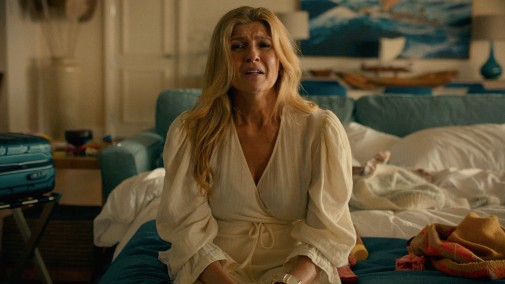
Connie Britton plays Nicole, Olivia's mother, and chose The White Lotus' fifth episode as her submission. It's an intelligent selection, as "The Lotus Eaters" contains some showy scenes of the character reacting to her family's disdain and later to a burglar's attack. It's easy to find shades of Nicole in other Britton characters from years past, especially Cathy from Beatriz at Dinner, but that doesn't mean her work is any less effective. Honing on the brittleness of this businesswoman on holiday, the actress shows tender feelings bubbling in a haze of irritation, illuminating how hurt Nicole can be. More importantly, this episode gives her an entire arc to play, closing on a note of marital reconciliation.
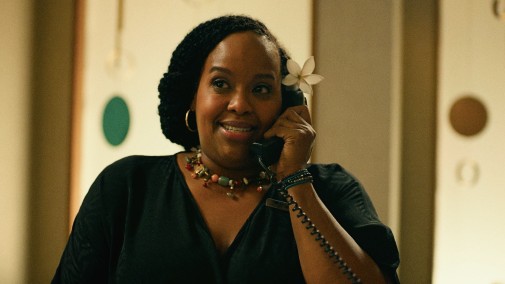
Finally, both Alexandra Daddario and Natasha Rothwell picked the season finale, the only episode where the two significantly interact. That last tidbit is interesting since the actresses represent two extremes within the show's main cast. Daddario has the most screen time out of all the actors, verging on leading lady status. Yet, at the same time, Rothwell is the most ancillary figure, being the only resort staff represented in this Supporting Actress lineup. These realities are reflected in their work and how the text articulates their reflections, their resolutions. Rothwell, in particular, feels like she's playing someone fed up with being a supporting character in her own life.
As Belinda, she spends most of the season's six episodes playing second fiddle to Tanya, subserviently helping the resort's guest while being held hostage by the promise of a business investment. In "Departures," that dream is laid to rest, and, for the first time, we see Belinda's perfectly pleasant façade crumble under the weight of dashed hope. These scenes hit like a kick to the solar plexus, breaking the show's most stable character while revealing the pains of emotional labor. However, Belinda’s subsequent apathetic dismissal of a guest in crisis shows us Rothwell's deft creation. Her anger, though never overt or too demonstrative, is palpable, shaking the screen in a final moment that makes the viewer want to applaud.
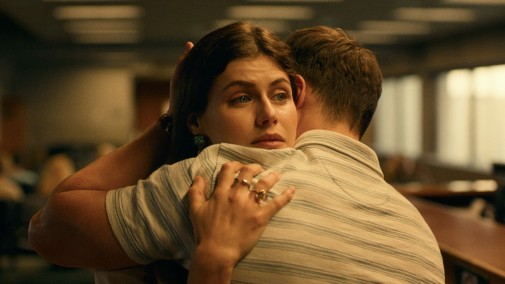
Daddario's Rachel gets a sadder conclusion. After a hellish honeymoon with her douchebag husband, she's ready to call it quits, recognizing what an enormous mistake the marriage was. And yet, the actress doesn't appeal to histrionics or melodrama, depicting Rachel's anguish like something internal that's barely allowed to come to the surface. At times, it's as if she's afraid of her feelings, the words stinging as they spew from her mouth no matter their truthfulness. Eyes shining with terror, she's a picture of a person imploding. Despite all this, by the end, Daddario must play an about-face and make it make sense.
And that she does, solving one of the screenplay's toughest twists with a sense of aching authenticity. It's not pretty, but it feels real.
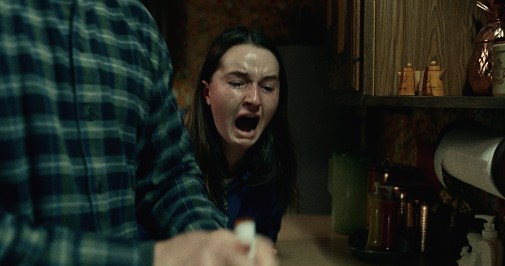
The same can be said of Kaitlyn Dever's tour de force as Betsy in Dopesick. By episode five, the lesbian mine worker has fallen into a bottomless pit of addiction, her very soul eaten away by need. In "The Whistleblower," she's at her lowest, stealing her mother's heirlooms to sell them for drug money and later freaking out as her father pours the pills down the drain. Dever fully embodies withdrawal, every motion a struggle, and her eyes that of a scared animal. However, the feverish frailty doesn't hold a candle to the addict's despair once relief is violently taken away, voice splitting into ragged howls, her body possessed.
Terrifying, Dever momentarily makes Dopesick into a horror series, unsparingly revealing what Oxycontin has done to Betsy. In another episode, the young woman mentions she misses who she used to be, and Dever makes us feel that loss deeply. Her transformation is too visceral to be ignored.
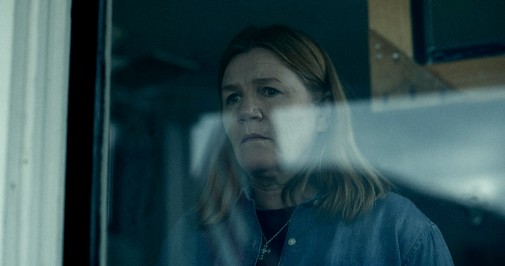
In the role of Betsy's mother, Diane, Mare Winningham doesn't get as juicy material as Dever. Her chosen episode is an incredible submission, nonetheless. "Black Box Warning" starts with the matriarch looking for her daughter in drug dens, taking her home for another try at rehab. Through discussions of faith and second chances, Diane exposes her parental guilt, believing that her early homophobic rejection propelled Betsy into her current state. All in all, it's beautiful work from Winningham, delicate and understated, culminating in two breathtaking actorly touches. First, there's a flurry of motion, a fierce, frantic embrace overflowing with unthinkable sorrow. Then, on a perfunctory phone call, the actress opts for dry directness instead of sentimentality. It's a counterintuitive decision that feels apt and shows how deeply the actress seems to understand the woman she's playing.
The Dopesick women's story is so moving that I can envision an upset on Emmy night. At the very least, if the submissions count for anything, Dever has a good chance of besting Coolidge. Then again, The White Lotu star is terrific, featuring prominently in her colleagues' submissions. Moreover, the TV Academy has shown a certain resistance to Dever in the past. Remember those snubs for Justified and Unbelievable? Speaking of Emmy history, Britton is on her fifth nomination and has yet to win, so this might be a good time to honor her. On the other hand, Winningham is a returning champion, having won Emmys in 1980 and 1998. So a victory for any of these actresses is possible.
Will Win: Jennifer Coolidge
Should Win: Mare Winningham
Spoiler: Kaitlyn Dever
See here for a list of all Emmy nominees this year.
Who do you think will win the Limited Series Supporting Actress race? Who are you rooting for?
MORE ANALYSIS